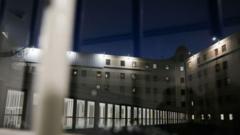The new €400 million facility, set to house up to 500 inmates, intends to target the organized crime network while addressing escalating violence linked to criminal gangs within the country.
**France to Establish High-Security Prison in Amazon for Organized Crime**

**France to Establish High-Security Prison in Amazon for Organized Crime**
France plans to construct a high-security prison in French Guiana aimed at drug traffickers and radical extremists, announced Justice Minister Gérald Darmanin during his recent visit.
France is set to build a high-security prison deep in the Amazon jungle of French Guiana, targeting organized crime such as drug trafficking and radical Islamist activities. During a visit to the territory, Justice Minister Gérald Darmanin informed the press that the facility, which is projected to cost €400 million (£337 million) and accommodate 500 inmates, aims to dismantle the drug supply chain by detaining criminals at various levels.
The planned prison will feature a segregated section designed for the most dangerous offenders, operating under a stringent regime intended to neutralize threats posed by powerful drug traffickers. This initiative is a direct response to a series of violent incidents linked to criminal gangs that have seen attacks on prisons and staff throughout France.
Darmanin emphasized that the remote location of the prison would effectively sever connections between incarcerated drug lords and their networks, making it difficult for them to orchestrate criminal activities from behind bars. French Guiana, a region that operates under French jurisdiction, has been an increasingly attractive route for drug smuggling due to its proximity to South America.
In conjunction with this plan, the French government is introducing new measures to combat organized crime, including legislation that establishes a dedicated branch of the prosecutors' office for organized crime, enhanced powers for investigators, and protection for informants. The recent attacks on prisons, described by Darmanin as "terrorist" acts, have prompted action, highlighting the urgency of addressing the influence of violent drug gangs.
Saint-Laurent-du-Maroni, the selected site for the new facility, has historical significance as the former entry point to the notorious Devil's Island penal colony, which housed tens of thousands of convicts from its establishment in 1852 until 1954. The announcement is part of a broader strategic approach by French officials to establish prisons more resilient to external influences in the ongoing battle against organized crime.
The planned prison will feature a segregated section designed for the most dangerous offenders, operating under a stringent regime intended to neutralize threats posed by powerful drug traffickers. This initiative is a direct response to a series of violent incidents linked to criminal gangs that have seen attacks on prisons and staff throughout France.
Darmanin emphasized that the remote location of the prison would effectively sever connections between incarcerated drug lords and their networks, making it difficult for them to orchestrate criminal activities from behind bars. French Guiana, a region that operates under French jurisdiction, has been an increasingly attractive route for drug smuggling due to its proximity to South America.
In conjunction with this plan, the French government is introducing new measures to combat organized crime, including legislation that establishes a dedicated branch of the prosecutors' office for organized crime, enhanced powers for investigators, and protection for informants. The recent attacks on prisons, described by Darmanin as "terrorist" acts, have prompted action, highlighting the urgency of addressing the influence of violent drug gangs.
Saint-Laurent-du-Maroni, the selected site for the new facility, has historical significance as the former entry point to the notorious Devil's Island penal colony, which housed tens of thousands of convicts from its establishment in 1852 until 1954. The announcement is part of a broader strategic approach by French officials to establish prisons more resilient to external influences in the ongoing battle against organized crime.


















